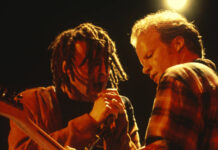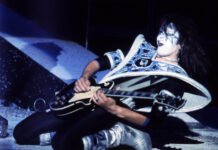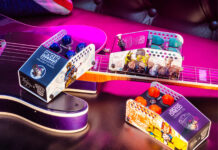
Marcus King on pushing himself out of his comfort zone with Rick Rubin
History tells us that if a guitar player is in the market for a bit of self-mythologising, they tend to think of their instrument as an axe, or a sword. If most of them were being honest, though, they might admit to recognising something of themselves in Marcus King’s description of it as a shield.
READ MORE: Steve Albini got it right when it came to recording guitar – and you can too
Still only 28, the South Carolina native has been a barn-burning blues-rock draw for more than a decade and, for the vast majority of that time, his electrifying fretwork has meant that no-one much cared what was going on in his head once he stepped off stage. Whether he was leading a band or playing teenage sideman to his father, Marvin King, the only thing anyone needed to know about Marcus was that this kid could go.
All that has changed, though, because he has just put out a record that reduces this old way of thinking to splinters. “I feel like I’m finally being heard,” he says. On Mood Swings – his third solo release since putting the Marcus King Band on ice – King spares no detail in laying out a period in his life that almost ended it. These songs mean it’s now impossible to avoid the flesh and blood behind the player.
Image: Andy Hawkes
The Other Side
Having long lived with anxiety and depression, King chased childhood trauma and a debilitating break-up with booze and drugs (antidepressants and the other kind) while stumbling towards his 2022 LP Young Blood and out the other side. On that record, he re-teamed with the Black Keys’ Dan Auerbach to track rugged, live-sounding songs that King became convinced would be the last to bear his name while he was alive. Almost in real-time, though, they came to resemble an old skin.
Fair winds ensured King changed course. He read an Instagram comment saying he’d been too fucked up to play the night before and decided to try a sober show. It worked, so he walked a little further down that road. He met his now wife, the vocalist Briley Hussey, and followed up on another chance encounter. In 2020, he had wandered into the orbit of Rick Rubin, heading out to Malibi and his Shangri-La complex. While there he laid down a take of Mood Swings’ title track with engineer Jason Lader.
Post-Young Blood he reconnected with Rubin, returning to Shangri-La and holing up at a semi-secret location in Italy. Soon, there was open water between who he was and who he wanted to become and Rubin, a producer whose name is inextricably linked with Beastie Boys or Slayer or Tom Petty or Johnny Cash depending on how your brain is wired, was along for the ride.
“I generally try to avoid researching whoever I’m about to write with or, in this case, is going to produce a record with me,” King says. “That way, I tend to not get nervous or have any kind of preconceived notion of what the session is going to be. But, with Rick, his reputation precedes him and there was no real way for me to avoid that. So, it was an exciting challenge. I knew that he was going to throw me through some hoops that I wouldn’t generally go through. It was exactly how it was supposed to be. It was like a mindful journey as much as it was a musical one.”
Open Heart
The songs King wrote were open and melodic, almost as though he wanted to match his words to more recognisable pop shapes in order for people to catch his drift as easily as possible. His voice, soulful and barrel-chested, fell into moments of neo-soul and supine country-rock. “One of the biggest efforts on this record was to strip away all the metaphor and just be entirely, gut-wrenchingly honest to whatever degree that meant,” King reflects.
He played Rubin guitar and voice demos he’d made at Shangri-La, with a lightbulb appearing over the producer’s head when he heard Bipolar Love, a lush, slow-burn jam that is studded with thorns. “I’ve been crazy as long as I can remember, you went crazy when I met you,” King sings at one point. “Rick just really loved it,” he recalls.
“He loved it conceptually, how it was completely honest. There was no colourful language shrouding the truth. He was really excited about that. He was like, ‘I want more of that.’ I spent the better part of a year out at Shangri-La writing and I’d say 99% of what I wrote we didn’t use. I was breaking old or bad habits, and learning how to cut through to the truth.”
A crucial element in creating this sense of vulnerability was putting down his shield more often. “I wrote a lot more on piano,” King says, noting that removing his technical ability from the equation resulted in more creative problem-solving. “It levels the playing field,” he continues. “I’m not proficient enough to hide behind any kind of smoke and mirrors or tricks.”
Interestingly, one knock on effect of this dynamic is King becoming more considered when it comes to weaving together his vocals and lead playing, identifying pockets of space rather than riding in like the cavalry. On songs such as Hero, he sings hook upon hook, handing off to a guitar solo before retrieving the baton for the final stretch.
“That goes all the way back to my grandfather,” he observes. “That was something that he was always stressing the importance of as far as expressing oneself in an improvisational zone. My family was all about improv. They didn’t call it improvisation, they just called it playing. But my grandfather was like, ‘Your melody ain’t worth a damn if you don’t want to quote it during your solo.’ I’m like, ‘Well, that makes a lot of sense.’ You’ve got to write a melody worthy of somebody playing or singing it, you know?”
Image: Andy Hawkes
Red Rocks
Another piece of granddaddy King is all over Mood Swings. His 1962 Gibson ES 345, nicknamed Big Red, has been Marcus’s go-to for years, forming the basis for his signature model. “That’s a given,” he says, also noting the importance of his Harmony Sovereign to the record’s acoustic palette. “That’s all over This Far Gone,” he says. “That’s just a really primo example of that guitar and the colour that it provided to the album.”
Elsewhere, though, King was keen to get away from the idea of needing extremely specific gear at any one moment. Again, it’s that idea of ditching the shield. “Ever since I started working in the studio at 11 years old there have been certain amplifiers that followed me,” he says. “My Super Reverb’s been in every session until very recently. On this record I didn’t have anything to hide behind and bouncing around, trying to keep up with Rick, was a big reason for that.”
“It allowed me to shed these constants and work with whatever’s around,” he continues. “I believe, pretty earnestly, that if you were to give Merle Travis or Billy Strings or Tommy Emmanuel something off the shelf they’re going to sound like Merle or Billy or Tommy. It’s more about the intention. There’s only 12 notes and it’s a slab of wood with some strings on it.”
Rubin’s approach to equipment, too, is that it’s just there, whether it’s his ‘66 ES-330 or a J-50 that is usually knocking about. “He has a few that mean a lot to him, but the thing you’ve got to understand is he’s not a guitar player,” King observes. “His guitars are cool, but they need some love. I’m a guitar player, but I’m not a luthier. When I got to Italy, I had most of the record to play bass on – we didn’t have a bass player in the original sessions – and there’s this off-brand bass that’s missing a machine head. My guy was able to MacGyver it, make it work.”
These factors set dominoes falling in King’s mind. The songs were honest and working in this way felt honest, so he started chasing it a little bit. “For me, the most enjoyable tones I achieved were going straight through the console at Shangri-La,” he says. “I loved that. I was trying to use natural resources. We were in this old, gutted schoolhouse recording in Tuscany, so I was like, ‘Let’s use the reverb of this hallway.’ We just put the Super in there. The new Supers sound great. There was a Deluxe Reverb that was used at the Shangri-La chapel.”
Hearing King talk about this process, it’s easy to pick up on how much he enjoyed it, and how much of an impression it left on him. Given what these songs are about, it’s easy to assume that he’s going to park Mood Swings and quickly move on. But he’s not running from it. “What’s interesting,” he counters, “is that all the memories attached to this record now are from making it, and none of the subject matter. That was all lived out.”
Marcus King’s ‘Mood Swings’ is out now through Snakefarm Records.
The post Marcus King on pushing himself out of his comfort zone with Rick Rubin appeared first on Guitar.com | All Things Guitar.
Source: www.guitar-bass.net













